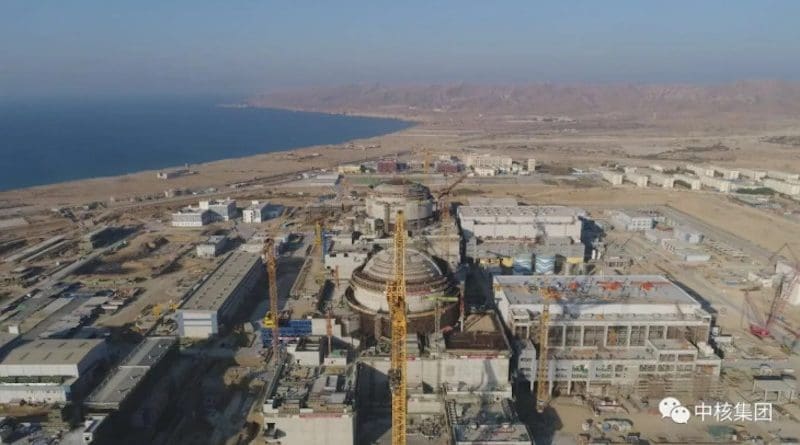Role Of Nuclear Energy For Combating Climate Change In Pakistan – OpEd
Climate change can be regarded as one of the biggest threats to the future of humanity because of its direct relation with water, food, and human security. Pakistan is among the countries which are highly vulnerable to climate change despite only being responsible for releasing 1% of total greenhouse gas emissions. Since Pakistan is an underdeveloped country with an agrarian base, it has become imperative for the state to take more serious measures to combat the effects of climate change.
In this regard, the biggest hurdle for Pakistan is its reliance on thermal sources of power generation. Therefore, in the future to generate more sustainable and environment-friendly electricity, Pakistan can rely more on nuclear energy. Nuclear power generation is a renewable, sustainable, and green source of electricity production. Pakistan while having a very robust peaceful nuclear program can generate electricity from it. So, nuclear energy provides Pakistan with a reliable solution to the two most serious issues to its economic, societal, and national security.
NASA declares “climate change” as a situation where change or fluctuation is observed in the normal weather conditions of a certain area, region, or city; this change could be an overall change in earth’s temperature or change in the amount or timings of rainfall or change of temperature in a certain area. Scientists and scholars pin climate change on two reasons; one is natural and the second is unnatural. A natural phenomenon that causes climate change happens because when the Earth revolves around the sun in its orbit annually. It is the unnatural causes of climate change that are degrading the environment of the Earth which primarily is occurring because of the greenhouse gas emissions.
Today environmental issues like pollution, sea-level rise, global warming, floods, droughts, and heat waves occur primarily because of fossil fuel burning. This results in the emission of greenhouse gases followed by the release of carbon dioxide. The UN has declared climate change as the most “systematic threat to humankind”. However, states are struggling to reduce the effects of climate change and greenhouse gas emissions, according to the estimates these emissions have gone higher than 40 % since 2000. In 2015 “Paris Agreement” was signed to handle the issue by adopting more progressive actions and to keep the rising global temperature below the 2 ‘C.
One of the important measures to reduce the consumption of thermal sources for energy generation would be to reduce the amount of thermal energy generation by states all around the world. Today the ratio between thermal electricity generation and all other sources of electricity generation is 65:35. So, the electricity produced worldwide is causing greenhouse gas emissions which could be reduced by producing electricity through nuclear power.
Scientists have estimated that nuclear power reactors produce almost one-third of less carbon dioxide emissions than solar power generators, also emit less carbon dioxide than hydropower generators, and produce the same amount of carbon dioxide as wind power generators. Thus, in this regard nuclear power is one of the substantial alternatives that could bring more diversification in the global energy mix by significantly reducing the global warming and effects of climate change.
Pakistan is one of the most vulnerable countries to climate change; every year it faces huge damages because of untimely rains, floods, and heat weave. With the realization that Pakistan needs to counter climate change, the country has started producing electricity more from nuclear energy and is carefully considering not going ahead with two more coal power plants.
Pakistan is a signatory of the Paris Agreement of 2015 which works toward lowering down the Earth’s temperature to avoid the worst impacts of climate change. To achieve the goal of lowering the temperature it is necessary that by the mid of the century to reduce the greenhouse gas emissions by power generation sources to zero percent.
In such an objective nuclear power is a key player. Other than nuclear power, hydropower is also an important source of power generation which is based on green and renewable energy. However, with growing climate change, drought, underground water shortage, and hanging water crisis with India, nuclear energy would be a source for Pakistan without any outside variable to cause hindrance.
Today Pakistan operates a nuclear capability of 2,332 MWe and an additional 1,100 MWe is under construction. Moreover, it would also allow Pakistan to be part of energy diplomacy by offering its capabilities to other states. However, Pakistan’s participation in this diplomacy and trade is dependent on the Nuclear Suppliers Group that regulates nuclear and nuclear-related exports to ensure the adherence to the principle of non-proliferation written in the Non-proliferation treaty. Ironically, NSG has given a waiver to India, a non-signatory of NPT, to make a nuclear deal with the US, which was against the non-proliferation principles and norms. Pakistan on the other hand, regardless of its adherence to international practices of nuclear safety and security, has been facing discrimination at the international level.
Realpolitik would play its course, what is important for Pakistan is that in the meantime it diversifies the energy mix by adding more renewable and clean energy generation sources to it. One of the best options available to Pakistan with a huge capability of electricity generation is nuclear power, which should be implored further for less reliance on imported oil and gas for electricity generation. As it would reduce carbon dioxide emission in the country and strengthen Pakistan’s action towards mitigating the effects of climate change.
*Ahyousha Khan, Research Associate, Strategic Vision Institute, Islamabad.

